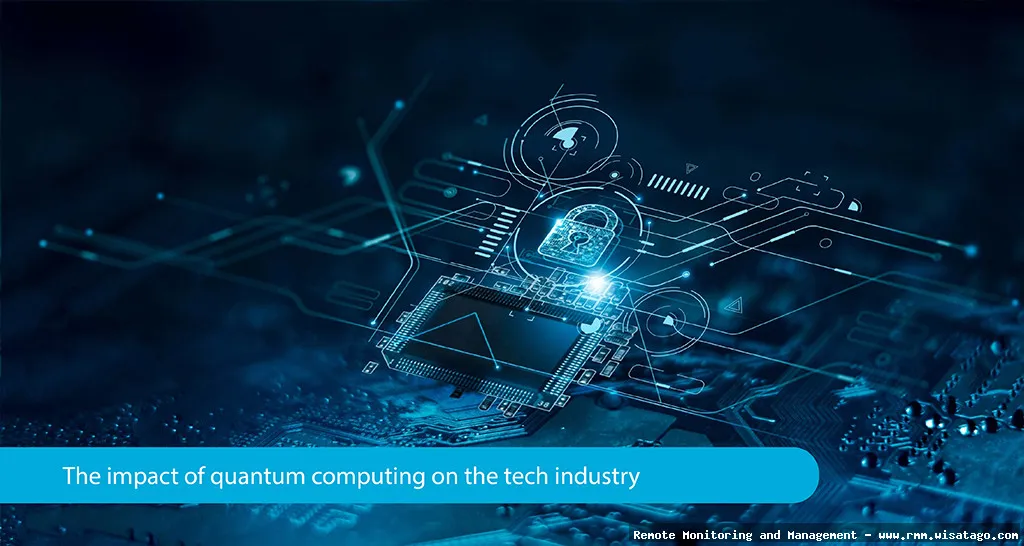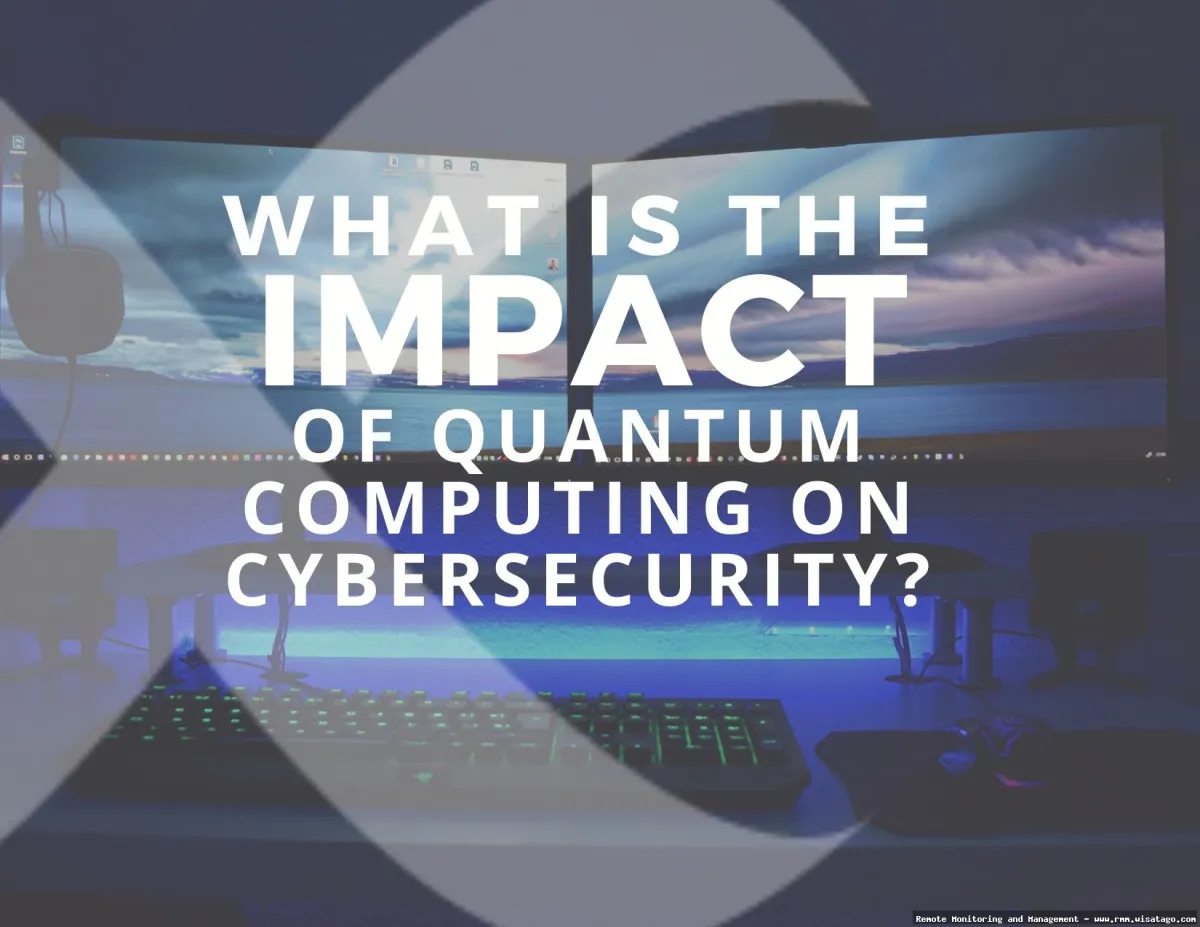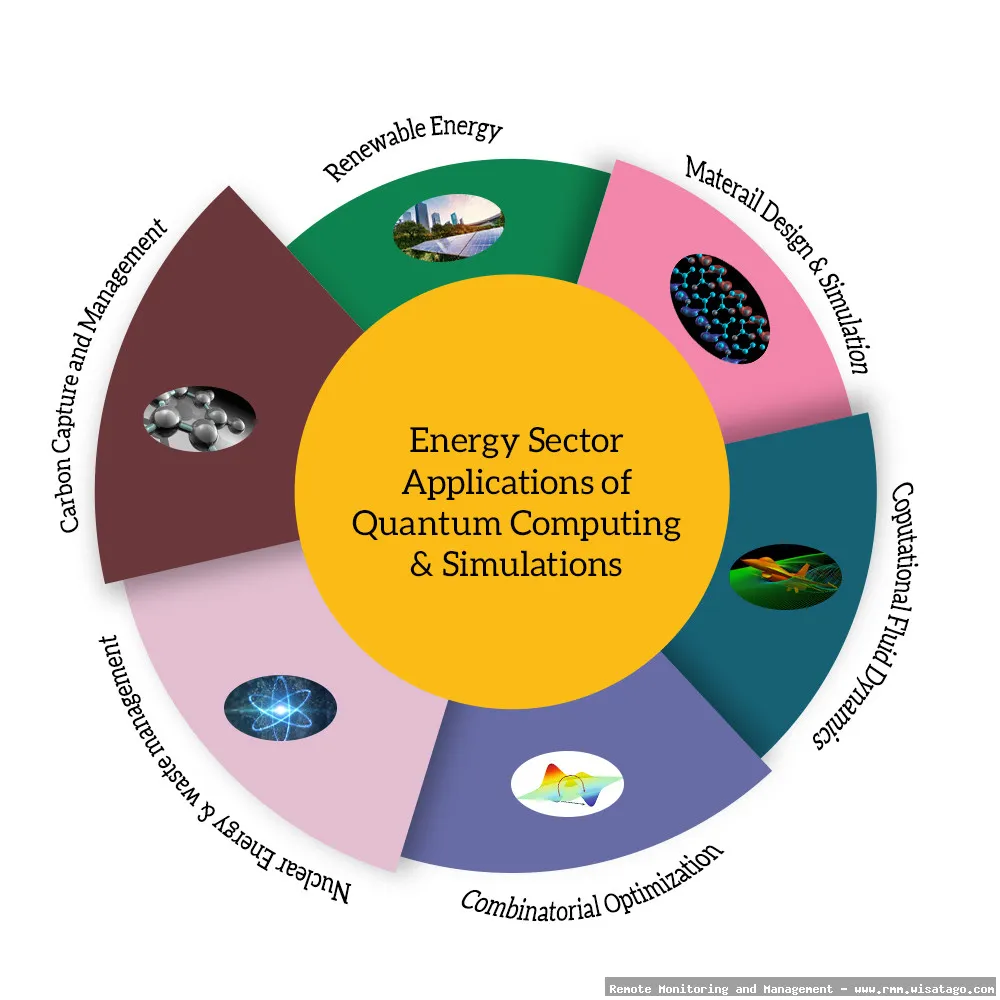Remote Management Solutions (RMS), or Remote Monitoring and Management (RMM) as many of us in the IT trenches call them, have become absolutely indispensable. Think about it: in today’s interconnected world, businesses rely heavily on IT infrastructure that spans across geographical locations. Keeping all those systems humming smoothly is a monumental task, one that would be nearly impossible without the right tools. RMM solutions provide the visibility and control we need to proactively manage endpoints, servers, networks, and applications, regardless of where they’re physically located. We’re talking about patching vulnerabilities, troubleshooting issues, deploying software, and ensuring compliance, all from a centralized platform. It’s a game-changer.
But the world of IT never stands still. New technologies emerge constantly, promising to revolutionize how we do things. Quantum computing is one of those technologies, and while it’s still in its early stages, its potential impact is enormous. We’re not talking about replacing your desktop with a quantum computer anytime soon, but rather about leveraging the unique capabilities of quantum computers to enhance existing IT solutions. This is particularly relevant for RMM, where the ability to process vast amounts of data and solve complex optimization problems could lead to significant improvements in efficiency, security, and overall performance.

So, how exactly will quantum computing impact RMM? That’s what we’re going to explore in this article. We’ll delve into the potential applications of quantum computing in RMM, examining how it can enhance areas like threat detection, anomaly analysis, resource allocation, and automation. We’ll also discuss the challenges associated with implementing quantum-enhanced RMM and explore the future of this exciting technology. Buckle up, because we’re about to take a deep dive into the quantum realm of remote management!
Quantum Computing: A Brief Overview
Before we dive into the specifics of how quantum computing can impact RMM, it’s important to have a basic understanding of what quantum computing actually is. Unlike classical computers that store information as bits representing 0 or 1, quantum computers use qubits. Qubits can exist in a superposition, meaning they can represent 0, 1, or a combination of both simultaneously. This allows quantum computers to perform calculations that are impossible for classical computers.
Superposition and Entanglement
Superposition is only half the story. The other key concept is entanglement. When qubits are entangled, they become linked together in such a way that the state of one qubit instantly influences the state of the other, regardless of the distance separating them. This allows quantum computers to perform parallel computations on a massive scale, leading to exponential speedups for certain types of problems.
Quantum Algorithms and Their Potential
While quantum computers are powerful, they aren’t a magic bullet. They excel at solving specific types of problems, particularly those involving optimization, simulation, and cryptography. For example, Shor’s algorithm can factor large numbers exponentially faster than any known classical algorithm, posing a threat to current encryption methods. Grover’s algorithm provides a quadratic speedup for searching unsorted databases. These algorithms, and others like them, have the potential to revolutionize various aspects of RMM.
Impact on RMM: Enhanced Threat Detection
One of the most promising applications of quantum computing in RMM is enhanced threat detection. RMM solutions generate vast amounts of data related to network traffic, system logs, and endpoint activity. Analyzing this data to identify malicious activity is a complex task, often requiring sophisticated algorithms and significant processing power. Quantum computing can help in several ways:
Anomaly Detection with Quantum Machine Learning
Quantum machine learning (QML) algorithms can be used to identify anomalies in network traffic and system behavior. These algorithms can learn patterns in normal data and then detect deviations from those patterns that may indicate a security breach. Because quantum computers can process data much faster than classical computers, QML algorithms can detect anomalies in real-time, allowing for faster response times to security threats.

Improved Intrusion Detection Systems (IDS)
Quantum-enhanced IDS can analyze network packets and system logs with greater accuracy and speed. By using quantum algorithms to identify patterns associated with known malware and attack vectors, IDS can proactively block malicious traffic and prevent intrusions. Furthermore, QML can help the IDS adapt to new and evolving threats, improving its overall effectiveness.
Quantum-Resistant Encryption
As mentioned earlier, Shor’s algorithm poses a threat to current encryption methods. Quantum-resistant cryptography, also known as post-quantum cryptography, aims to develop encryption algorithms that are resistant to attacks from quantum computers. RMM solutions can incorporate these quantum-resistant algorithms to protect sensitive data transmitted between managed devices and the central management server.
Impact on RMM: Optimized Resource Allocation
RMM solutions are also used for resource allocation, ensuring that IT resources are used efficiently and effectively. Quantum computing can help optimize resource allocation in several ways:
Smart Scheduling and Load Balancing
Quantum optimization algorithms can be used to optimize scheduling and load balancing across a network. By considering factors such as server capacity, network bandwidth, and application requirements, these algorithms can determine the optimal allocation of resources to minimize latency and maximize performance. This can lead to significant improvements in application responsiveness and user experience.
Predictive Maintenance and Failure Prevention
Quantum machine learning can be used to predict equipment failures and schedule maintenance proactively. By analyzing sensor data and system logs, QML algorithms can identify patterns that indicate an impending failure. This allows IT teams to schedule maintenance before the failure occurs, minimizing downtime and preventing costly repairs. This is particularly valuable for managing critical infrastructure.
Efficient Energy Management
Quantum computing can also be used to optimize energy consumption in data centers and other IT environments. By analyzing energy usage patterns and identifying areas where energy is being wasted, quantum optimization algorithms can help reduce energy consumption and lower operating costs. This is becoming increasingly important as businesses strive to reduce their carbon footprint.

Impact on RMM: Enhanced Automation
Automation is a key aspect of RMM, allowing IT teams to automate repetitive tasks and free up time for more strategic initiatives. Quantum computing can further enhance automation capabilities:
Intelligent Scripting and Orchestration
Quantum-enhanced scripting engines can automate complex tasks and workflows with greater efficiency. By using quantum algorithms to optimize script execution and resource allocation, these engines can reduce the time required to complete tasks and improve overall performance. This can be particularly useful for automating tasks such as software deployment, configuration management, and patch management.
Self-Healing Systems
Quantum machine learning can be used to create self-healing systems that can automatically detect and resolve problems without human intervention. By analyzing system logs and performance data, QML algorithms can identify the root cause of problems and automatically take corrective action. This can significantly reduce downtime and improve system resilience.
Automated Compliance and Audit Trails
RMM solutions must often adhere to various compliance regulations (e.g., HIPAA, GDPR). Quantum computing can automate compliance monitoring and audit trail generation. Quantum algorithms can analyze system configurations and activity logs to ensure compliance with relevant regulations and automatically generate audit reports. This simplifies the compliance process and reduces the risk of non-compliance penalties.
Challenges and Considerations
While the potential benefits of quantum computing in RMM are significant, there are also several challenges and considerations that need to be addressed:. Effective IT management requires a holistic approach, where RMM plays a crucial role in monitoring and maintaining systems remotely
.
Hardware Availability and Cost
Quantum computers are still in their early stages of development and are not yet widely available. The cost of quantum hardware is also very high, making it inaccessible to many organizations. As quantum technology matures, the availability and cost of quantum computers are expected to improve, but it will likely be several years before they become commonplace.

Software Development and Expertise
Developing software for quantum computers requires specialized skills and knowledge. Quantum programming languages and tools are still relatively new, and there is a shortage of skilled quantum programmers. Organizations that want to leverage quantum computing will need to invest in training and development to build the necessary expertise.
Integration with Existing Systems
Integrating quantum computing into existing RMM solutions can be complex. Quantum computers are typically used as accelerators for specific tasks, rather than as replacements for classical computers. This means that RMM solutions need to be designed to seamlessly integrate with quantum computers and efficiently transfer data between classical and quantum systems.
Data Security and Privacy
Quantum computing also raises concerns about data security and privacy. As mentioned earlier, Shor’s algorithm poses a threat to current encryption methods. Organizations need to ensure that their data is protected from quantum attacks by implementing quantum-resistant cryptography and other security measures. Additionally, the use of quantum machine learning can raise privacy concerns, as these algorithms can potentially reveal sensitive information about users and systems.
The Future of Quantum-Enhanced RMM
Despite the challenges, the future of quantum-enhanced RMM is bright. As quantum technology matures and becomes more accessible, we can expect to see a growing number of RMM solutions incorporating quantum computing capabilities. This will lead to significant improvements in efficiency, security, and automation, enabling IT teams to manage increasingly complex and distributed IT environments more effectively.
Hybrid Quantum-Classical Solutions
The most likely scenario is that we’ll see the development of hybrid quantum-classical solutions, where quantum computers are used to accelerate specific tasks within RMM workflows, while classical computers handle the majority of processing. This approach allows organizations to leverage the benefits of quantum computing without having to completely overhaul their existing IT infrastructure.
Quantum-as-a-Service (QaaS)
Quantum-as-a-Service (QaaS) platforms will likely play a key role in making quantum computing accessible to a wider audience. QaaS platforms provide access to quantum computers and quantum software tools via the cloud, allowing organizations to experiment with quantum computing without having to invest in expensive hardware. This will lower the barrier to entry and accelerate the adoption of quantum-enhanced RMM.

Continuous Evolution
The field of quantum computing is rapidly evolving, and we can expect to see significant advancements in quantum hardware, software, and algorithms in the coming years. RMM solutions will need to adapt to these advancements to remain competitive and provide the best possible service to their customers. This requires a commitment to continuous learning and innovation.
In conclusion, quantum computing has the potential to revolutionize RMM by enhancing threat detection, optimizing resource allocation, and improving automation. While there are challenges associated with implementing quantum-enhanced RMM, the potential benefits are significant. As quantum technology matures, we can expect to see a growing number of RMM solutions incorporating quantum computing capabilities, leading to a more efficient, secure, and automated future for IT management.
Conclusion
In conclusion, the advent of quantum computing presents both a significant opportunity and a potential threat to remote management solutions. While the enhanced computational power promises to revolutionize areas like optimization, cryptography, and data analysis, enabling more efficient and secure remote operations, it also poses a grave danger to existing encryption methods safeguarding sensitive data. The race is on to develop quantum-resistant algorithms and security protocols to mitigate these risks and fully harness the beneficial aspects of this disruptive technology. The implications are far-reaching, impacting everything from remote infrastructure management to secure data transfer across distributed teams.
Ultimately, embracing a proactive and informed approach is crucial. Organizations must begin assessing their current security infrastructure, understanding their vulnerabilities to potential quantum attacks, and investing in research and development of quantum-resistant solutions. Staying informed about the latest advancements in quantum computing and cryptography is paramount. We encourage readers to explore resources from organizations like the National Institute of Standards and Technology (NIST) and to actively participate in industry discussions to prepare for the quantum era and ensure the continued security and effectiveness of their remote management solutions. Further exploration can begin with a visit to NIST‘s Quantum Information Science page.
Frequently Asked Questions (FAQ) about Quantum Computing Impact on Remote Management Solutions
How could quantum computing potentially impact the security of remote management solutions, especially considering current encryption methods?
Quantum computing presents a significant challenge to the security of remote management solutions because many of the encryption algorithms currently used rely on the computational difficulty of certain mathematical problems, such as factoring large numbers (used in RSA) or the discrete logarithm problem (used in Diffie-Hellman). Shor’s algorithm, a quantum algorithm, can solve these problems exponentially faster than the best-known classical algorithms. This means that a sufficiently powerful quantum computer could potentially break these widely used encryption methods, compromising the confidentiality and integrity of remote access sessions and data transmitted through remote management tools. The transition to post-quantum cryptography (PQC), which involves algorithms resistant to attacks from both classical and quantum computers, is therefore crucial for maintaining the security of remote management solutions in the quantum era.
What are some practical ways remote management solution providers are preparing for the advent of quantum computers and the potential threats they pose to data security?
Remote management solution providers are actively preparing for the quantum computing era through several strategies. A primary focus is on adopting post-quantum cryptography (PQC). This involves researching, developing, and implementing new cryptographic algorithms that are resistant to both classical and quantum computer attacks. Many organizations are participating in standardization efforts led by NIST (National Institute of Standards and Technology) to evaluate and select suitable PQC algorithms. Beyond algorithm replacement, providers are also implementing quantum key distribution (QKD) where feasible, although its practical application in remote management faces challenges due to cost and distance limitations. Furthermore, regular security audits and penetration testing, specifically targeting potential vulnerabilities to quantum attacks, are becoming increasingly important. Finally, continuous monitoring of advancements in quantum computing and cryptography is essential to adapt and refine security strategies as the threat landscape evolves.
Beyond security risks, how might quantum computing potentially improve the efficiency and capabilities of remote management solutions in the future?
While quantum computing poses security risks, it also presents opportunities to enhance remote management solutions. Quantum machine learning algorithms could significantly improve anomaly detection and predictive maintenance capabilities. This allows for proactive identification of potential system failures and optimized resource allocation, minimizing downtime. Quantum-enhanced optimization algorithms could optimize network routing and bandwidth allocation in real-time, leading to more efficient remote access and reduced latency. Furthermore, quantum simulation could enable more accurate modelling of complex systems, aiding in troubleshooting and performance tuning. Ultimately, the integration of quantum computing could lead to smarter, more responsive, and more reliable remote management solutions, although the realization of these benefits requires significant advancements in both quantum hardware and software.